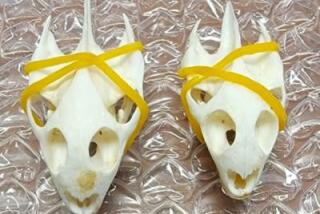If It Creeps, Crawls, Flies or Slithers, He Delivers
- Share via
Laszlo de Borondy will sell you a dozen dingoes or an octet of ocelots. If you need 10 red-legged tarantulas, he’ll find them. He’ll even rent you a brace of bobcats.
De Borondy is an animal broker who sells and rents creatures of all kinds for motion pictures, parties, parades, fashion shows, enthusiasts of exotica and the occasional practical joke. He maintains that he can obtain any animal on the face of the earth from extensive contacts in Asia, Africa, Australia, Europe and South America.
Prices at his exotic-pet store, Casa de Pets in Sherman Oaks, range from $5 for a barking toad to $75,000 for an Indian elephant. Expect to pay up to $22,000 for an alpaca and almost as much for an Argentine miniature horse called a Falabella. A camel will run you from $10,000 to $15,000. For $2,500 you can buy a Goliath frog imported from Cameroon that is 3 feet long and leaps 32 feet.
De Borondy laughs as he speaks of a regular customer, “a crazy film producer with a ranch in Texas.” This man, he says, pulls up in front of the store in a Model T Ford, buys an ostrich “and then takes off with the ostrich’s neck and head sticking out of the back seat of the Model T.”
All this may sound like a chapter out of Doctor Doolittle. But there are some who consider it a horror story.
“Most of the buyers don’t know much about the needs and care of exotic animals,” said Carmelita Pope, director of the Hollywood office of the American Humane Society. “Only professionals who really know these animals can give them proper care. Other people can be killing their exotic pets by inches, because they don’t properly understand their needs.”
The Fund For Animals, headed by Cleveland Amory, picketed Casa de Pets several years ago and threatened to put the shop out of business, de Borondy said.
“They protested the importation of animals,” he said. “They felt animals should be left alone in Africa, or wherever.”
Their attempt was unsuccessful. De Borondy’s services, although controversial, fall within the boundaries of the law.
The Hungarian-born businessman said he obtained veterinary credentials at the London College of Applied Sciences, but never received accreditation in the United States as a veterinarian. His pet business came about more through fate than design.
Hobby Expanded
“I left Hungary in 1957, after the revolution,” he said. “I was raising, handling, training and importing animals here until 20 years ago, when my hobby got out of hand and became a business.”
He agrees with the Humane Society that people are likely to harm exotic animals if they don’t know what they’re doing. De Borondy recalled the case of a client of his, a famous singer, who fed junk food, beer and drugs to his cockatoos until they lost many of their feathers. It took seven months to rehabilitate the birds.
“People need to be educated in the proper care of these animals,” de Borondy said. “Whenever someone buys an exotic animal from me, I always personally instruct them in proper care and feeding. I tell everyone, ‘Don’t hesitate to call me anytime with any question about animals.’ ”
In an effort to spread the word about animals’ needs, de Borondy helped set up an animal-husbandry class at Moorpark College.
“I have appeared on the Johnny Carson, Dinah Shore and Dick Cavett shows with various animals,” he said. “I also take animals to the schools and tell children about them and how they should be cared for.”
Born in Captivity
It is now illegal to import and sell animals that are born and raised in the wild. The animals de Borondy sells are bred in captivity. He keeps small animals in his shop and the larger ones on various ranches and farms around the state. De Borondy owns some animals and acts as a broker for the owners of others.
De Borondy admits that many people work around this law by bringing exotic animals from out of state. Michael Jackson’s baby giraffe, which he brought to his backyard zoo from Missouri, was recently confiscated by state game officials, but returned to the singing star after he got the appropriate licenses.
Not all the creatures in de Borondy’s shop are exotic. Casa de Pets features a variety of snakes, lizards, frogs, birds, mice, big hairy spiders and so on. He sells dogs and cats, too. He also stocks supplies for domestic and unusual animals, including such arcane items as talking records to improve a myna bird’s speech. He says the shop’s best sellers are the birds, snakes, lizards and tarantulas.
“These are pretty hardy animals, and it is educational for kids because they have to feed, clean and care for them,” he said. “We sell nothing that is dangerous. Our tarantulas are not poisonous. Nonetheless, several children have confided in me that a pet tarantula is just the thing to keep mother out of your room.”
Many of de Borondy’s exotic breeds are only rented for special events. Prices include: elephants, $1,200 to $1,500 a day; 18-foot python, $250; and birds, anywhere from $5 to $500 a day.
“I have no problem with companies renting animals out when there are professional handlers present,” said Pope, of the humane society.
Handlers Along
De Borondy confirmed that experienced handlers accompany all the animals he rents out. When film studios rent animals they always have a representative of the SPCA or the city’s Animal Regulation Department present to make sure the animal is not abused.
“Recently, a wealthy fellow called and asked me if he could rent a white elephant for his wife to ride around the block at her upcoming birthday party--not an albino elephant but one that had been painted white,” de Borondy said. “It’s not cheap, but I can produce it if he can come up with the money. I once provided a pink elephant for the GOP national convention.”
And then there was the time, several years ago, when Casa de Pets was burglarized and some of the animals escaped. Police found a large crowd watching a line of penguins waddle solemnly down Ventura Boulevard. They knew whom to call.
More to Read
Sign up for Essential California
The most important California stories and recommendations in your inbox every morning.
You may occasionally receive promotional content from the Los Angeles Times.










